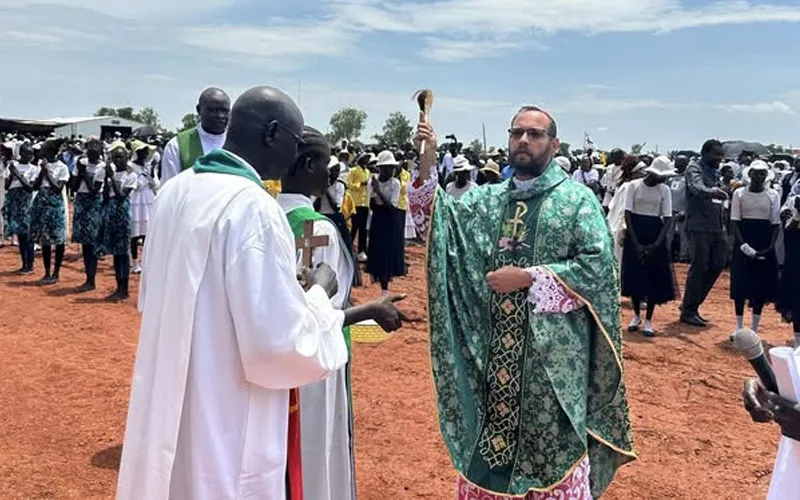“Seasonal rainfall has become quite unpredictable. There are periods of extreme drought and extreme rainfalls,” he says, adding that the change in rainfall patterns is making farming difficult, and the population has no irrigation options.
Additionally, the rise in the Nile river over the past four years has led to severe flooding in South Sudan, affecting around a million people every year, Bishop Carlassare says, and explains, “Large areas of arable land have been submerged. Many animals have died from diseases caused by the stagnant water.”
Those whose homes have been submerged have had to look for new homes due to their abject poverty. The relocation, he says, has often been met with hostile reactions from the local population. At the same time, limited access to resources has led to soil degradation and deforestation, which has further increased the risk of conflict.
Bishop Carlassare, who was ordained a Priest in September 2004 and commissioned to South Sudan, where he ministered in the country’s Catholic Diocese of Malakal , from which Bentiu Diocese was carved, says that since South Sudan's independence in 2011, oil revenues, which account for around 85 percent of gross domestic product, have provided “a certain basis for stability” for the country.
He however observes that the oil has also been a trigger for violent conflict, with the ruling class enriching itself from the revenues while the rest of the population is left impoverished.
(Story continues below)
“When South Sudan became independent, it had such extensive access to oil revenues that it was classified as a middle-income country. It was hoped that oil revenues would support the construction of the new State and finance the development of public infrastructure. Unfortunately, this has not been the case,” the Catholic Church leader laments.
Bishop Carlassare’s Episcopal appointment for Rumbek Diocese in March 2021 was followed by the life-threatening episode of his being shot in both legs on 26 April 2021. The situation pushed his Episcopal Consecration that had been initially scheduled for Pentecost Sunday that year (23 May 2021) to the Solemnity of the Annunciation the following year, on 25 March 2022.
In his article shared with ACI Africa on January 9, the Local Ordinary of Bentiu Diocese has reflected on the implications of the ongoing civil war in Sudan for South Sudan, noting that the two neighbouring countries are “highly interdependent.”
He notes that many South Sudanese used to live in Sudan, because it offered good opportunities for work, study and medical care. “This is no longer the case,” Bishop Carlassare says, and adds, in reference to the civil war that broke out on 15 April 2023, “Most of them have returned to South Sudan, but have lost everything and are now left with no way to start anew in their homeland.”
In reference to the Nuer and the Dinka, who inhabit Bentiu, the Comboni Missionary Bishop says, “The relationship between these two groups is not simple. A priority of the Diocese is to build bridges of reconciliation between these two groups.”
Agnes Aineah is a Kenyan journalist with a background in digital and newspaper reporting. She holds a Master of Arts in Digital Journalism from the Aga Khan University, Graduate School of Media and Communications and a Bachelor's Degree in Linguistics, Media and Communications from Kenya's Moi University. Agnes currently serves as a journalist for ACI Africa.





